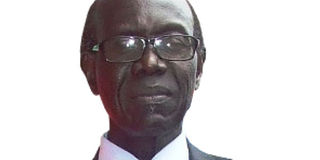Prime
MAK @100: Challenge of building for the future

What you need to know:
- Government must increase substantially annual budgetary allocation to the premier university of Uganda.
This year marks the centenary of one of Africa’s greatest institutions of higher learning which is my alma mater, Makerere University. During the week I arrived as a freshman at Makerere College of the University of East Africa (UEA) in June 1967, I felt and knew instinctively that I made the best and right decision for my academic career.
The University of East Africa was split into three national universities in 1970, namely, Makerere University Kampala, University of Nairobi and University of Dar es Salaam. My classmates at Makerere included Albert Yobo, Edward Keronega, Philemon Mateke, Milcah Litaru, Ruth Anyoti, John Butime and Atieno Odhiambo.
With the benefit of hindsight, I wish UEA was not disbanded because academic standards in East Africa have generally declined since then. Unlike UEA, University of West Indies (UWI) in Kingston, Jamaica, exists and thrives today.
The motto of Makerere College, founded in 1922, was in Latin: Pro futuro aedificamus (we build for the future). Is Makerere building for the future of Uganda, Africa and the world? That is the challenge facing Makerere as Ugandans prepare to celebrate the centenary of university.
On this auspicious occasion I would like to express and convey warm congratulations to the chancellor, vice chancellor, academic staff, support staff, alumni, friends and above all to students of the great Makerere University.
ALSO READ: Is university education relevant?
The fire which gutted the iconic Main Hall of Makerere on September 20, 2020, is a bad omen for the university and for Uganda. One hopes the Main Hall which was the landmark of Makerere University will be rebuilt soon. I believe Makerere University will rise from the ashes and shine again.
In an Opinion piece titled, ‘The role of a university in a developing African country’ published in Daily Monitor of December 11, 2011, I raised a number of legitimate concerns about Makerere which have regrettably not been adequately addressed. Among those who sent me feedback on the opinion was Prof Apolo Nsibambi who concurred with most of the pertinent issues I raised, especially the high student/teacher ratio, the trend towards commercialisation of Makerere University, poor terms of service of academic staff and appalling living conditions of students on campus.
Nsabambi (RIP) was a former chancellor of Makerere University, prime minister and one of my Political Science lecturers in the 1968/1969 academic year.
What can be done to enable Makerere University to rise and shine again?
First, as a public institution government must increase substantially annual budgetary allocation to the premier university of Uganda so that Makerere can vigorously and relentlessly pursue and realise its core mission, namely, to search for the truth, contribute to the advancement of the frontiers of knowledge and undertake original research in all fields of human endeavour, including the Arts and Sciences.
Second, in addition to public resources the vice chancellor should take the initiative to mobilise financial resources from the private sector, which is a major beneficiary of the products of the university and alumni of the university who are willing to support the institution that groomed them.
Third, there is an urgent need to address the challenge of student/teacher ratio. According to reliable sources, undergraduate classes at Makerere University are too big and consequently difficult to manage efficiently and effectively. I was surprised to learn that weekly tutorial classes have been abandoned because of the large number of students admitted for most courses. Makerere must not sacrifice quality for quantity.
Fourth, I would like to advise the Political Science department to drop Public Administration from its nomenclature because it’s frankly superfluous. May Makerere build for the future!




